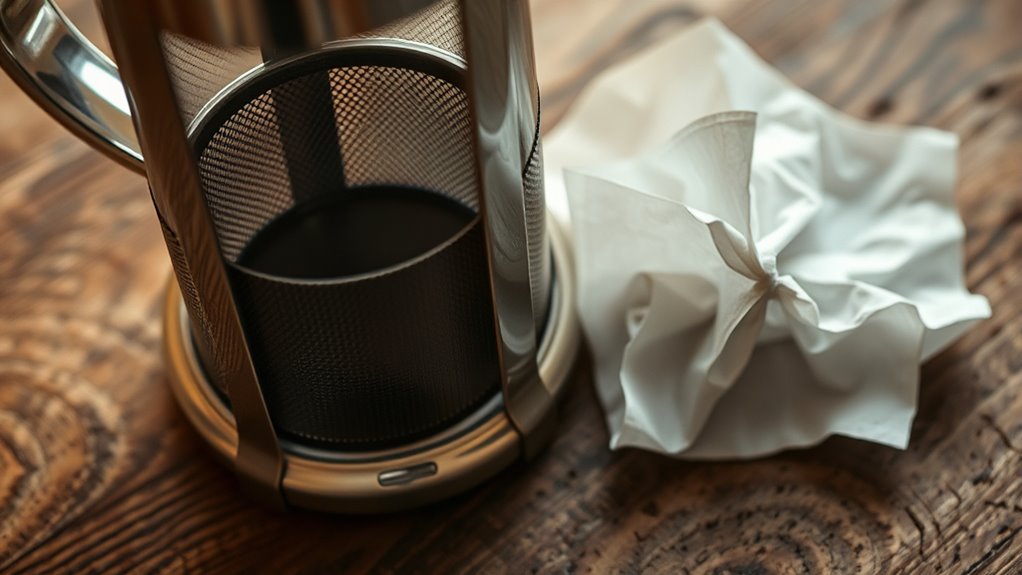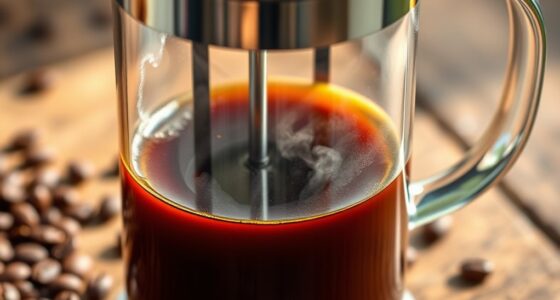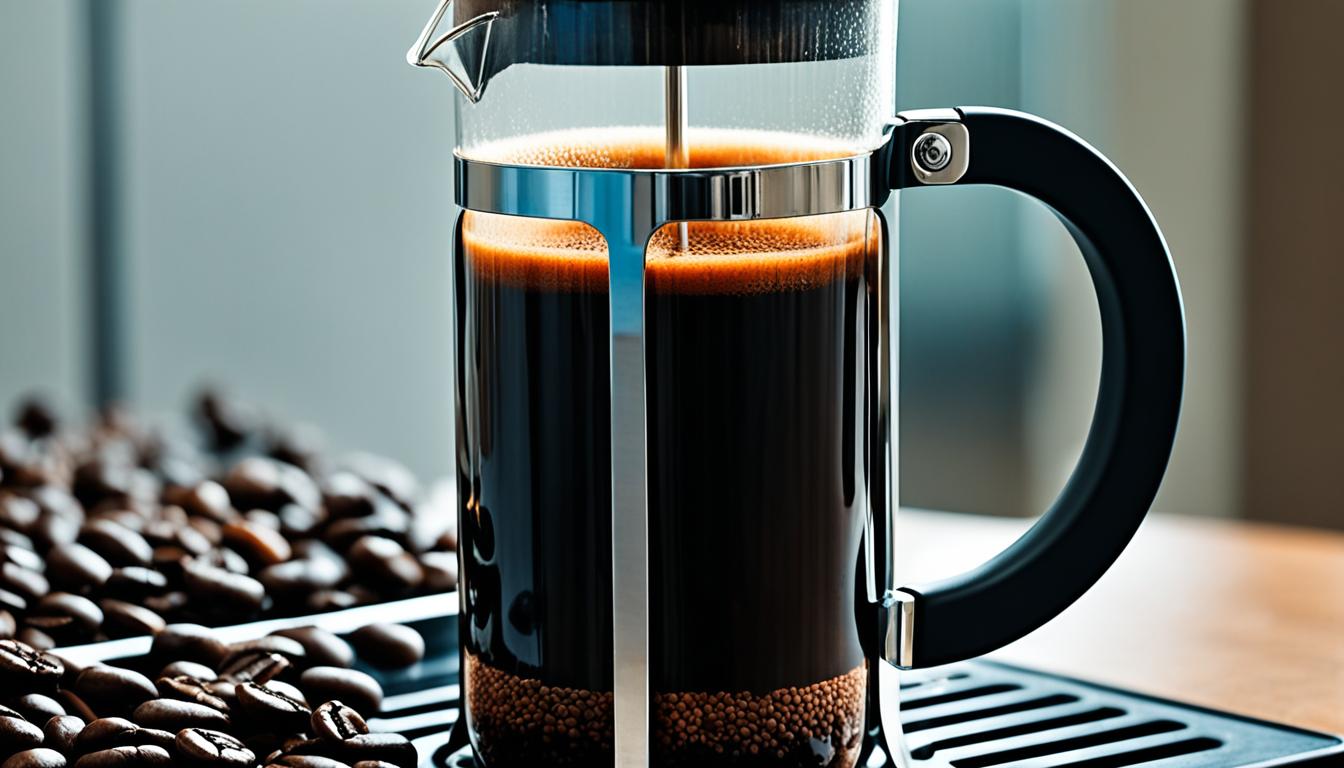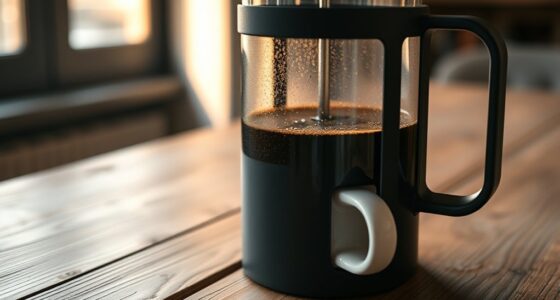Using a metal filter in your French press allows more oils and fine particles to pass through, resulting in a richer and fuller-bodied brew. In contrast, paper filters trap oils and tiny grounds, producing a cleaner, brighter cup with less sediment. Metal filters are reusable but require regular cleaning, while paper filters are disposable and more convenient. To discover how each choice impacts your coffee experience and find your best brew, keep exploring the details.
Key Takeaways
- Metal filters allow more oils and fine particles, resulting in a richer, fuller-bodied brew compared to paper filters’ cleaner taste.
- Paper filters trap oils and sediments, producing a brighter, clearer cup with less sediment than metal filters.
- Metal filters require regular cleaning for optimal flow and flavor, while paper filters are disposable and lower maintenance.
- Metal filters are reusable and eco-friendly, whereas paper filters generate waste with each use.
- Choice influences flavor, texture, and convenience: metal offers a fuller body with more upkeep, paper favors ease and clarity.

Filtering methods for French press coffee are essential for achieving the perfect cup, as they directly impact the texture and clarity of your brew. The choice between metal and paper filters influences not only the final flavor but also how you manage your brewing process. When evaluating these options, consider how each affects your grinding consistency and maintenance requirements, since these factors play a vital role in your overall coffee experience.
If you opt for a metal filter, you’ll find that it allows more of the coffee’s natural oils and fine particles to pass through, resulting in a richer, fuller-bodied brew. Metal filters typically have a coarser mesh, which means you need to pay close attention to your grinding consistency. For best results, use a medium-coarse grind, as a grind that’s too fine can clog the filter and lead to over-extraction, while a grind that’s too coarse might produce a weak or underdeveloped flavor. Metal filters are durable and reusable, making them a sustainable choice. However, they require regular maintenance—cleaning involves rinsing or brushing out residual oils and particles to prevent buildup that could affect flavor and flow rate. If neglected, the filter can become clogged or develop off-flavors, so a consistent cleaning routine is necessary.
In contrast, paper filters provide a cleaner cup by trapping more of the oils and finer particles. This results in a brighter, clearer brew with less sediment, which appeals to those who prefer a lighter, more refined flavor profile. Using paper filters also simplifies maintenance—once you’ve brewed, you simply discard the used filter. The trade-off is that paper filters can absorb some of the coffee’s oils, slightly diminishing the richness of the flavor. You’ll need to pay attention to your grind size here too; a medium grind works best, ensuring the water flows smoothly through the paper without clogging or causing excessive resistance. Since paper filters are disposable, they eliminate the need for cleaning, but they generate waste, which may concern environmentally-minded coffee drinkers.
Ultimately, your choice depends on your taste preferences and willingness to maintain your brewing equipment. Metal filters demand more upkeep but offer a fuller-bodied experience, while paper filters provide convenience and clarity, with less maintenance. Whichever you choose, paying attention to grinding consistency will ensure your French press delivers the best possible flavor, and understanding the maintenance requirements helps keep your setup functioning efficiently for every brew.
Frequently Asked Questions
How Does Filter Material Affect Coffee Flavor?
The filter material considerably impacts your coffee’s flavor by influencing filter taste and brewing clarity. A metal filter allows more oils and fine particles through, resulting in a richer, fuller-bodied taste but may feel grittier. A paper filter traps more oils and sediments, offering a cleaner, brighter flavor with enhanced clarity. Choose based on your preference for a bolder or smoother cup, as the material shapes the overall flavor experience.
Are There Any Health Concerns With Metal Filters?
No, there aren’t significant health concerns with metal filters. They’re durable, so you won’t need frequent replacements, and they don’t introduce chemicals into your coffee like some paper filters might. However, metal filters can sometimes cause a slight metal taste if they’re old or not cleaned properly. To avoid this, verify your filter stays clean, and you’ll enjoy fresh coffee without worrying about health risks or unwanted flavors.
Can Paper Filters Be Reused?
Like a fleeting summer breeze, paper filters aren’t meant to be reused. They’re single-use, so reusing them can lead to reusability issues and compromise flavor. Plus, reusing paper filters increases environmental impact because they’re designed for one-time use, adding waste each time. For eco-conscious brewing, opt for metal filters, which are durable, reusable, and better for the environment in the long run.
Which Filter Type Is Better for Oily Coffee Beans?
You should choose a metal filter for oily coffee beans since it has a longer filter lifespan and allows more oils to pass through, enhancing flavor. Metal filters are more cost-effective over time because you won’t need frequent replacements like paper filters. Paper filters tend to trap oils, which can reduce the richness of your brew, but they’re cheaper upfront. Overall, for oily beans, a metal filter delivers better taste and durability.
How Do Cleaning Requirements Differ Between Filter Types?
Cleaning filter maintenance is like tending a garden—requires regular care. Metal filters are easy to rinse and can be scrubbed, making them reusable and eco-friendly, reducing environmental impact. Paper filters, on the other hand, are disposable; you simply throw them away after each use. While paper filters demand less maintenance, they generate waste. Choose based on your preference for easier cleaning versus environmental considerations.
Conclusion
So, whether you opt for a sleek metal filter or the humble paper one, remember, you’re just avoiding the true truth: French press coffee is basically a flavor-filled mud bath. Metal filters let more grit slide through, adding that charming “earthy” touch—if you’re into dirt. Paper filters, on the other hand, promise a cleaner cup, but at what cost? Either way, you’re still drinking coffee—just with a side of existential debate. Cheers to your filtered destiny!








